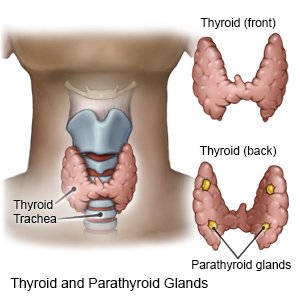Acquired Hypothyroidism in Children
Medically reviewed by Drugs.com. Last updated on Apr 6, 2025.
What is acquired hypothyroidism?
Acquired hypothyroidism is a condition that develops when your child's thyroid gland makes little or no thyroid hormone. Thyroid hormones help control body temperature, heart rate, growth, and gaining or losing weight. Thyroid hormones play an important role in the normal growth and development of children. Acquired hypothyroidism usually affects children starting at 6 months of age. Some children who have hypothyroidism when they are born show signs and symptoms much later in childhood.
 |
What causes acquired hypothyroidism?
The following conditions may cause or increase your child's risk for acquired hypothyroidism:
- History of autoimmune disease
- Family history of hypothyroidism or an autoimmune disease
- Certain medicines taken during pregnancy
- Radiation therapy or thyroid surgery
- Thyroid cancer, an enlarged or swollen thyroid, or lumps caused by infections
- Low iodine levels
What are the signs and symptoms of acquired hypothyroidism?
The signs and symptoms of acquired hypothyroidism may be different depending on your child's age.
- Early signs and symptoms:
- Bulging soft mass in the belly
- Coarse or dull-looking facial features
- Delay or failure in growth and development
- Dry, flaky skin or brittle fingernails
- Hoarseness and a large tongue
- Later signs and symptoms:
- Depression, fatigue, or irritability
- Sensitivity to cold
- Learning, speech, or behavior problems
- Constipation
- Delay in sexual development
- Swelling of his or her whole body, very slow heartbeat, and trouble breathing
Drugs used to treat this and similar conditions
Synthroid
Synthroid (levothyroxine) treats hypothyroidism (low thyroid hormone) and different types of ...
Armour Thyroid
Armour Thyroid is used for hashimoto's disease, hypothyroidism, after thyroid removal, thyroid ...
Omvoh
Omvoh is used to treat moderate to severe ulcerative colitis or Crohn's disease in adults. This ...
Levoxyl
Levoxyl treats hypothyroidism (low thyroid hormone) and treats or prevents goiter. Learn about side ...
Cytomel
Cytomel is used for hypothyroidism, after thyroid removal, myxedema, myxedema coma, thyroid ...
Tirosint
Tirosint is used for hashimoto's disease, hypothyroidism, after thyroid removal, myxedema coma ...
Nature-Throid
Nature-Throid is used for hashimoto's disease, hypothyroidism, after thyroid removal, thyroid ...
Unithroid
Unithroid is used for hashimoto's disease, hypothyroidism, after thyroid removal, myxedema coma ...
Euthyrox
Euthyrox (levothyroxine) is used to treat hypothyroidism and to treat or prevent goiter. Includes ...
Liothyronine
Liothyronine systemic is used for hypothyroidism, after thyroid removal, myxedema, myxedema coma ...
How is acquired hypothyroidism diagnosed?
Your child's pediatrician will ask about your child's symptoms and examine him or her. The pediatrician will ask what medicines your child takes. You may also be asked about your child's medical history and if anyone in your family has hypothyroidism. Your child may have blood tests to check his or her thyroid hormone level.
How is acquired hypothyroidism treated?
Thyroid hormone medicine helps return your child's hormone level back to normal.
Treatment options
The following list of medications are related to or used in the treatment of this condition.
Call your local emergency number (911 in the US) if:
- Your child has choking episodes or sudden trouble breathing.
- Your child faints or has a seizure.
When should I call my child's pediatrician?
- Your child has swelling around the eyes, or in the legs, ankles, or feet.
- Your child becomes nervous or restless.
- Your child has diarrhea, tremors, or trouble sleeping.
- Your child has a fever.
- Your child has chills, a cough, or feels weak and achy.
- Your child's signs and symptoms return or become worse.
- Your child's skin is itchy, swollen, or has a rash.
- You have questions or concerns about your child's condition or care.
Care Agreement
You have the right to help plan your child's care. Learn about your child's health condition and how it may be treated. Discuss treatment options with your child's healthcare providers to decide what care you want for your child. The above information is an educational aid only. It is not intended as medical advice for individual conditions or treatments. Talk to your doctor, nurse or pharmacist before following any medical regimen to see if it is safe and effective for you.© Copyright Merative 2025 Information is for End User's use only and may not be sold, redistributed or otherwise used for commercial purposes.
Learn more about Acquired Hypothyroidism
Treatment options
Care guides
Symptoms and treatments
Medicine.com guides (external)
Further information
Always consult your healthcare provider to ensure the information displayed on this page applies to your personal circumstances.
